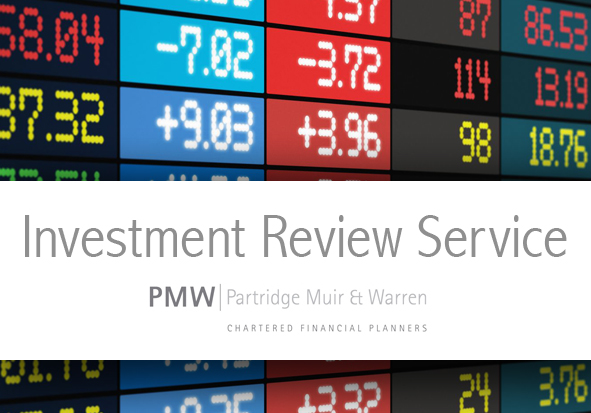FINANCE
Surrey’s Premier Lifestyle Magazine
Reasons to be Cheerful
Simon Lewis reflects on recent investment returns and looks forward to the future with increasing confidence.

Happy clients
We always enjoy our review meetings with clients. It is a good opportunity to catch up with their news and take some time to step back and look at the big picture as far as their personal financial plan is concerned. It is also a time to report on the performance of their investments over the preceding 12 months and it is good to be able to deliver great news; our Wealth Management Service clients have typically enjoyed returns of between 12% and 20% over the last year, depending upon the amount of risk it was agreed they would take.
Plenty to be optimistic about
The review meeting is also an opportunity to talk about our current view of the world and in particular, the geopolitical, macroeconomic and business themes that are likely to develop and have a bearing on future investment returns. With our customary caution, I must admit that there is a temptation to downplay the prospect of good investment returns over the next year or so. After all, clients have done so well recently and many of the major stock markets are at, or close to, their all-time high. Surely this cannot continue?
There is a famous stock market saying of, "Sell in May and come back on St Leger Day". This refers to the fact that historically (before my time!) city traders spent a lot of time away from their trading desks over the summer months, leading to reduced trading volume and as a result, increased volatility. However, investors who take this outmoded approach (most trading is computer based these days and computers don’t spend their summers on holiday and attending sporting events) will miss out on some key events that are likely to move markets in one way or another. In particular, June is going to be a busy month.
8 June - UK General Election
Of course, the domestic focus is the forthcoming general election. It's never a good idea to rely on opinion polls but common sense dictates that Theresa May's government will achieve a much increased majority. This can only be positive for the UK. I appreciate that this might be a controversial statement to some, however, the most important issue facing the UK right now, having voted to leave the EU, is to negotiate the most beneficial terms for our future relationship with the EU. So far, the narrowness of the government's majority means that it is far too dependent upon marginal factions on both sides of the House. A strong mandate will enable a more considered and rational approach and therefore improve the chance of achieving the best deal.
History has shown that self-conscious governments, which are constantly obsessed by public mood swings, are seldom effective.
Unfortunately, the economic illiteracy of the opposition renders it ineffective.
The populist notion of levying high rates of tax on business and the very rich is, in the modern world, naive. Many of the very rich who live in the UK are not British and will simply move elsewhere if their wealth is threatened. Companies must serve the interests of their shareholders first and will therefore choose to locate themselves in countries that offer a supportive tax environment. President Trump is proposing to slash US corporation tax rates so now is not a good time for the UK to be increasing its rates. Better that we attract rather than repel wealth creators; otherwise we must accept less from the State or be prepared to pay more ourselves to fund it.
We always enjoy our review meetings with clients. It is a good opportunity to catch up with their news and take some time to step back and look at the big picture as far as their personal financial plan is concerned. It is also a time to report on the performance of their investments over the preceding 12 months and it is good to be able to deliver great news; our Wealth Management Service clients have typically enjoyed returns of between 12% and 20% over the last year, depending upon the amount of risk it was agreed they would take.
Plenty to be optimistic about
The review meeting is also an opportunity to talk about our current view of the world and in particular, the geopolitical, macroeconomic and business themes that are likely to develop and have a bearing on future investment returns. With our customary caution, I must admit that there is a temptation to downplay the prospect of good investment returns over the next year or so. After all, clients have done so well recently and many of the major stock markets are at, or close to, their all-time high. Surely this cannot continue?
There is a famous stock market saying of, "Sell in May and come back on St Leger Day". This refers to the fact that historically (before my time!) city traders spent a lot of time away from their trading desks over the summer months, leading to reduced trading volume and as a result, increased volatility. However, investors who take this outmoded approach (most trading is computer based these days and computers don’t spend their summers on holiday and attending sporting events) will miss out on some key events that are likely to move markets in one way or another. In particular, June is going to be a busy month.
8 June - UK General Election
Of course, the domestic focus is the forthcoming general election. It's never a good idea to rely on opinion polls but common sense dictates that Theresa May's government will achieve a much increased majority. This can only be positive for the UK. I appreciate that this might be a controversial statement to some, however, the most important issue facing the UK right now, having voted to leave the EU, is to negotiate the most beneficial terms for our future relationship with the EU. So far, the narrowness of the government's majority means that it is far too dependent upon marginal factions on both sides of the House. A strong mandate will enable a more considered and rational approach and therefore improve the chance of achieving the best deal.
History has shown that self-conscious governments, which are constantly obsessed by public mood swings, are seldom effective.
Unfortunately, the economic illiteracy of the opposition renders it ineffective.
The populist notion of levying high rates of tax on business and the very rich is, in the modern world, naive. Many of the very rich who live in the UK are not British and will simply move elsewhere if their wealth is threatened. Companies must serve the interests of their shareholders first and will therefore choose to locate themselves in countries that offer a supportive tax environment. President Trump is proposing to slash US corporation tax rates so now is not a good time for the UK to be increasing its rates. Better that we attract rather than repel wealth creators; otherwise we must accept less from the State or be prepared to pay more ourselves to fund it.
An increased government majority will likely strengthen the pound and give some impetus to the valuation of UK small and midcap companies. FTSE 100 companies, that generally have a much greater proportion of their earnings overseas, will fare less well if sterling strengthens.
8 June – European Central Bank Policy Meeting
The ECB will announce its latest policy for interest rates. After announcing a reduction in the ongoing rate of quantitative easing in April, no change is expected. A continuation of what is regarded as very loose monetary policy (interest rates are still negative) will be good news for European stock markets.
13 and 14 June - The Fed decides on rates
The Federal Open Market Committee meets on 13 and 14 June to decide on the future path for the US discount (‘interest’) rate. The rate was unchanged in May but many expect a further rise (following March’s 0.25% increase) in June. Increased borrowing costs are a headwind for businesses and consumers; of greater significance will be the confidence this will signal about the health of the US economy.
The Trump factor
Investors seem to be getting used to President Trump in that his unpredictability is becoming predictable. Regardless of his apparent flaws, his instincts and likely policies are unashamedly business-friendly and this can only be a good thing for corporate America and US stock markets.
In spite of the rampant growth of China in recent decades, the US continues to be the most significant economic influence on the world by virtue of its vast wealth.
A successful US economy is good for everyone in one way or another.
The Eurozone is recovering
The success of Emmanuel Macron in the French presidential election is serving to increase the political stability of the EU at a time when the Eurozone is starting to benefit from a cyclical economic recovery. Whatever the outcome of the Brexit negotiations, the EU will remain the UK's most important trading partner, so an improving European economy will be good for the UK in the same way that a deteriorating European economy was bad for the UK in 2011.
China
The Chinese economy has performed better than expected and this is one of the factors that has led to a general recovery in commodity prices. An interesting fact about China’s development is that it used more cement between 2009 and 2012 than
the US used during the entire 20th century. Although there are likely to be some bumps in the road ahead, the ongoing transformation of the Chinese economy would seem unstoppable.
To conclude, the global economic environment is much more encouraging than a few years ago. All of the evidence shows that there is a positive correlation between economic prosperity and geopolitical stability, so hopefully we can look forward to a little less downside risk in the future.
Happy clients
As a consequence, unexpected geopolitical events aside, there is every reason for us to expect our client review meetings this time next year to deliver a positive story. If you would like us to provide you with a reason to be cheerful, please get in touch.
8 June – European Central Bank Policy Meeting
The ECB will announce its latest policy for interest rates. After announcing a reduction in the ongoing rate of quantitative easing in April, no change is expected. A continuation of what is regarded as very loose monetary policy (interest rates are still negative) will be good news for European stock markets.
13 and 14 June - The Fed decides on rates
The Federal Open Market Committee meets on 13 and 14 June to decide on the future path for the US discount (‘interest’) rate. The rate was unchanged in May but many expect a further rise (following March’s 0.25% increase) in June. Increased borrowing costs are a headwind for businesses and consumers; of greater significance will be the confidence this will signal about the health of the US economy.
The Trump factor
Investors seem to be getting used to President Trump in that his unpredictability is becoming predictable. Regardless of his apparent flaws, his instincts and likely policies are unashamedly business-friendly and this can only be a good thing for corporate America and US stock markets.
In spite of the rampant growth of China in recent decades, the US continues to be the most significant economic influence on the world by virtue of its vast wealth.
A successful US economy is good for everyone in one way or another.
The Eurozone is recovering
The success of Emmanuel Macron in the French presidential election is serving to increase the political stability of the EU at a time when the Eurozone is starting to benefit from a cyclical economic recovery. Whatever the outcome of the Brexit negotiations, the EU will remain the UK's most important trading partner, so an improving European economy will be good for the UK in the same way that a deteriorating European economy was bad for the UK in 2011.
China
The Chinese economy has performed better than expected and this is one of the factors that has led to a general recovery in commodity prices. An interesting fact about China’s development is that it used more cement between 2009 and 2012 than
the US used during the entire 20th century. Although there are likely to be some bumps in the road ahead, the ongoing transformation of the Chinese economy would seem unstoppable.
To conclude, the global economic environment is much more encouraging than a few years ago. All of the evidence shows that there is a positive correlation between economic prosperity and geopolitical stability, so hopefully we can look forward to a little less downside risk in the future.
Happy clients
As a consequence, unexpected geopolitical events aside, there is every reason for us to expect our client review meetings this time next year to deliver a positive story. If you would like us to provide you with a reason to be cheerful, please get in touch.
essence info
Simon Lewis is writing on behalf of Partridge Muir & Warren Ltd (PMW), Chartered Financial Planners, based in Esher. The Company has specialised in providing wealth management solutions to private clients for 46 years. Simon is an independent financial adviser, chartered financial planner and chartered fellow of the Chartered Institute for Securities and Investment. The opinions outlined in this article are those of the writer and should not be construed as individual advice. To find out more about financial advice and investment options please contact Simon at Partridge Muir & Warren Ltd. Partridge Muir & Warren Ltd is authorised and regulated by the Financial Conduct Authority.Telephone: 01372 471 550
Email: simon.lewis@pmw.co.uk
Website: www.pmw.co.uk
“Better that we attract rather than repel wealth creators; otherwise we must accept less from the State or be prepared to pay more ourselves to fund it.”

